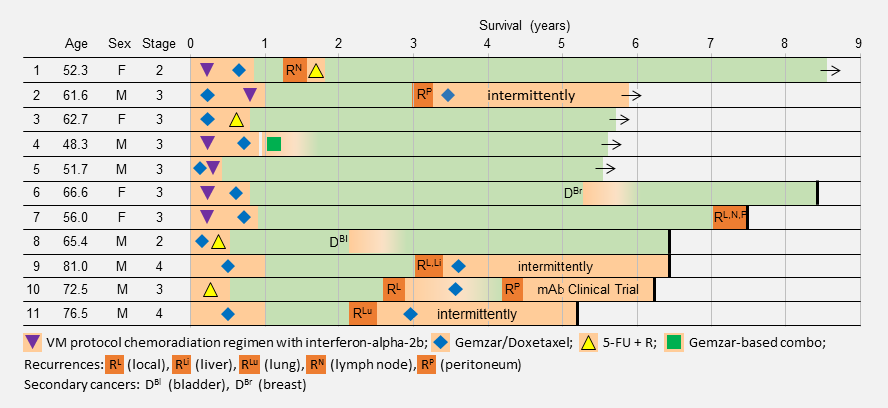Overview
Curative resection is not offered to most pancreatic cancer patients and information about long-term survivors in this group is scarce. In late 2015, Virginia Mason Medical Center (VMMC) authors documented the characteristics of their eleven long-term pancreatic cancer survivors that never had curative surgery.
Here I’ll present relevant insights into these patients that succeeded at long-term survival. I’ll break down and summarize important information from this paper. Perhaps you will find yourself in one of these patients? Keep in mind that these patients were all treated at VMMC and their therapies will be similar to VMMC’s protocol.
| Paper | Rare long-term suvivors of pancreatic adenocarcinoma without curative resection |
| Authors | Oh SY, Edwards A, Mandelson MT, Lin B, Dorer R, Helton WS, Kozarek RA, Picozzi VJ |
| Publication | World J of Gastroenterol, 2015 Dec 28; 21(48): 13574-13581 |
| Links | [Abstract] [PDF] |
Key Points for Patients
- This paper documents 11 long-term pancreatic adenocarcinoma survivors treated at VMMC (Seattle, WA) who never had curative surgery
- At diagnosis, all long-term survivors were fully active (ECOG status 0), had normal albumin levels, and tumors at the head of the pancreas
- 2% [95% CI: 1.0% – 3.5%] of VMMC’s non-resected patients from 1995 to 2009 were ≥5-year survivors
- All non-metastatic patients were treated with some type of combined chemoradiation
- Most long-term survivors were overweight which the authors indicate may confer a survival advantage with diseases associated with wasting
- Long-term survivors were less likely to develop distant metastases with peritoneal metastases being the most survivable
- Of the 6 deaths recorded, 4 were not directly related to the tumor
- These patients were treated with VMMC’s preferred treatments. This report does not indicate superiority of their treatment regimen. Data from other institutions would be needed for valid comparisons.
Introduction
Very few publications concerning long-term pancreatic adenocarcinoma (PDAC) survival concentrate on patients who could not have curative resections. A 1988 Gastrointestinal Tumor Study Group paper suggested that long-term survival without surgery might be possible for some patients.1 A 2014 Korean review of 482 inoperable PDAC patients identified characteristics of long-term survivors, defined as >18 months for stage 4 and >27 months for stages 2-3.2 However, the paper I review here provides much more clinical detail on 11 long-term (≥5-year) pancreatic adenocarcinoma survivors treated at VMMC in Seattle, WA who never had curative surgery.
The Long-Term Survivors
The table below summarizes the VMMC’s long-term pancreatic cancer survivors diagnosis and treatment histories with additional details in the paper. At publication time, five long-term survivors survived. Of the remaining six, four died from sepsis not directly related to their tumor and the two metastatic patients died from disease progression.
The authors suspect these patients happened to have unique tumor biology that was susceptible to these treatments.
Common Attributes
All long-term pancreatic cancer survivors were in excellent health upon diagnosis. All had tumors in the head of the pancreas. Most were overweight or obese, a risk factor for pancreatic cancer, but which may also be a survival advantage as wasting is a common symptom.
Radiation
VMMC treated all locally advanced long-term pancreatic cancer survivors with some form of radiation. Most received the Virginia Mason protocol consisting of interferon-alpha-2b, 5-FU, cisplatin and radiation while the others received chemoradiation consisting of 5-FU and radiation (one had both). Radiation use is controversial and its importance in long-term pancreatic cancer survival is unknown.
Neither metastatic long-term pancreatic cancer survivors was treated with radiation.
Chemotherapy
As you might expect, Virginia Mason gave all long-term pancreatic cancer survivors their preferred treatments for pancreatic adenocarcinoma – especially the VM protocol and Gemcitabine/Doxetaxel. These treatments are not commonly used elsewhere. We won’t understand the importance until other institutions publish details about their long-term pancreatic cancer survivors using their preferred treatments. I suspect that a different set of their patients would thrive if they used another regimen.
Genetics
Patient #5 had a family history of cancers and a BRCA2 mutation. Due to other considerations, treatment lasted only 4 months but was unusually effective. The authors note that the VM protocol uses cisplatin which has been effective against BRCA2 tumors.3
Tumor Progression
In long-term survivors, tumors commonly progressed only in or near the tumor bed (local, lymph node, or peritoneum).
Conclusion
This paper gives a rare look at long-term pancreatic cancer survivors without curative surgery. Long-term survivors had excellent health, pancreas head tumors, local or no metastases, and effective treatments with long treatment holidays. Stenting of liver ducts was often necessary.
These patients were given VMMC’s preferred treatments. This report does not indicate superiority of their treatment regimen. Data from competitive institutions is needed for valid comparisons. I would not focus on the specific VMMC treatments.
The findings I find important are:
- first-line treatment was effective
- second-line treatment was effective
- distant metastases rarely appeared
- maintenance of body weight
Long-term survival of pancreatic cancer is possible. I believe that we need Investigation into matching treatments to patients to improve outcomes for more patients.
Read the paper for additional details.
Discrepancies
Here I note discrepancies between the paper and my interpretation.
- The paper says: “Non-resected ≥5-year survivors represented 2% (11/544) of all non-resected patients undergoing treatment for pancreatic cancer…”. By my count, there were 555 (544 <5-year survivors + 11 ≥5-year survivors) total patients. It does not change the 2% ratio, but I used 555 total patients when calculating the 95% Confidence Interval reported here.
Driving treatment decisions on 28 Aug 2016
References
[1]Gastrointestinal Study Group. (1988). “Treatment of locally unresectable carcinoma of the pancreas: comparison of combined-modality therapy (chemotherapy plus radiotherapy) to chemotherapy alone”. J Natl Cancer Inst 80(1):751-755. PMID: 2898536.
[2]Jo JH, et al. (2014 Oct). “Clinical characteristics of long-term survivors of inoperable pancreatic cancer: an 8-year cohort analysis in Korea”. Pancreas 43(7):1022-31. PMID: 24991970.
[3]Vyas O, Leung K, et al. (2015). “Clinical outcomes in pancreatic adenocarcinoma associated with BRCA-2 mutation”. Anticancer Drugs 26:224-226. PMID: 25304989.



This is an interesting article, I fall into this as I am 1.5 years into Pancreatic Cancer without Resection, although it was attempted unsucessfully. I have been out of treatment since March 2020 and the tumor has been stable so far. I started out Stage 3, did 7 months of Folfirinox and 5 days of the MRI guided radiation out of Detroit. I did start out overweight and I lost almost 80lbs during Chemotherapy and the unsucessful surgery. The odds are of course stacked against me, but I remain hopeful that the radiation did the trick. Thanks for posting the article.
David Keith Lee
I agree, the article is interesting.
As someone with family history of Pancreatic cancer, and being followed closely myself, I’m curious to know how you are doing Mr Lee.
I’ve received the same treatment hopefully im going in the same direction but all governments need to spend more on the disease research
David, my heart goes out to you, I am now in the same situation as you. May God watch over you